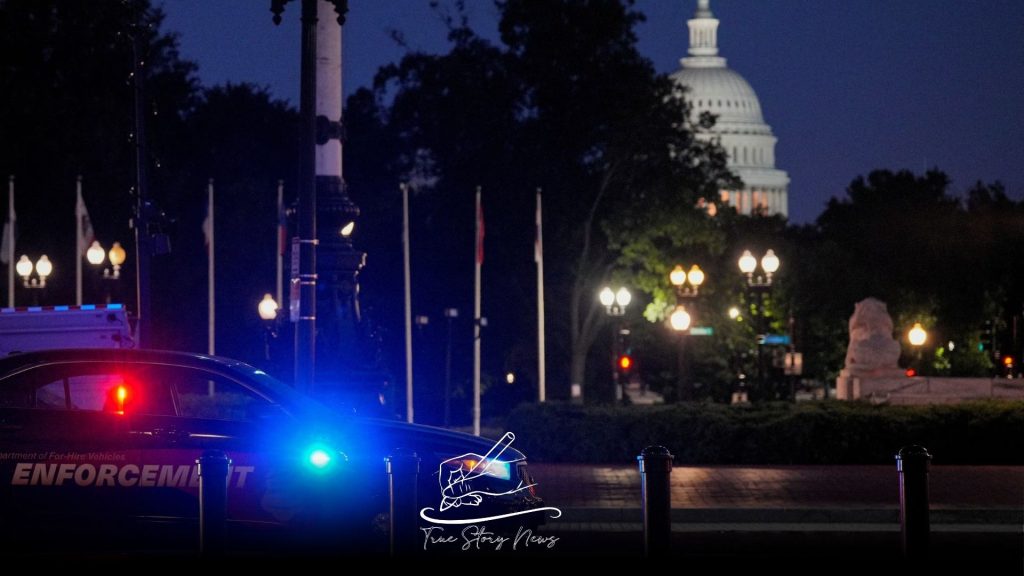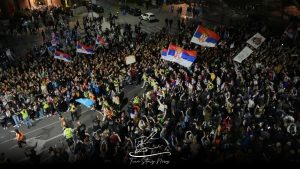On Monday, President Donald Trump announced the deployment of 800 National Guard troops to Washington, alongside a temporary takeover of the city’s police department. This move marks a significant exercise of presidential authority in the capital.
Trump’s decision to circumvent the city’s elected officials highlights a defining characteristic of his second-term strategy. This approach has involved exercising executive power in unprecedented ways, challenging established political norms in contemporary American governance.
The president characterised his actions as essential to “rescue” Washington from an alleged surge of lawlessness. Recent statistics indicate a significant increase in violent crime during 2023; however, there has been a notable decline in such incidents in the subsequent months.
During a news conference at the White House, Trump stated, “Our capital city has been overtaken by violent gangs and bloodthirsty criminals.”
This summer marks the second occasion on which the Republican president has sent troops to a city under Democratic governance. A federal trial commenced on Monday in San Francisco to determine if former President Trump breached US law by sending National Guard troops to Los Angeles in June without obtaining the consent of California Governor Gavin Newsom.
Trump indicated that other significant US cities under Democratic leadership might follow suit, highlighting Chicago, a city historically troubled by violent crime, despite a notable decrease in incidents during the first half of the year.
During a statement at the White House, Trump remarked, “If necessary, we will implement the same measures in Chicago, which is currently facing significant challenges,” and expressed hope that “L.A. is paying attention.”
Throughout Trump’s election campaign, his law and order platform frequently exhibited racial undertones. He highlighted predominantly Democratic cities such as Baltimore, Chicago, and Washington, all of which have significant Black populations, while addressing the issue of escalating crime in urban areas.
In recent days, a significant presence of officers and agents from over a dozen federal agencies has been observed throughout Washington, as they have deployed across the city. Trump announced that Attorney General Pam Bondi will take charge of the police force.
The US Army announced that National Guard troops will undertake various responsibilities, which encompass “administrative, logistics, and physical presence in support of law enforcement.” At any given moment, the deployment of troops to assist law enforcement is expected to range from 100 to 200 personnel.
Washington’s Democratic mayor, Muriel Bowser, has responded to former President Trump’s assertions regarding rampant violence, highlighting that violent crime reached its lowest point in over thirty years last year.
In 2023, violent crime rates, particularly murders, surged dramatically, positioning Washington as one of the most dangerous cities in the country. Federal data indicates that violent crime experienced a significant decline of 35% in 2024, with city police reporting an additional 26% decrease in the first seven months of 2025.
At a recent news conference, Bowser adopted a diplomatic stance, emphasising her commitment to collaborate with the federal government alongside her administration, while once more dismissing Trump’s assertion of widespread crime.
Bowser expressed concerns that the law seemed to grant the president extensive authority to assume temporary control of the police force. In contrast, the city’s attorney general, Brian Schwalb, previously labelled Trump’s actions as “unlawful” and indicated that his office was “considering all of our options.”
Trump intensifies his rhetoric.
In recent days, Trump has ramped up his rhetoric, indicating a potential move to revoke the city’s local autonomy and pursue a comprehensive federal takeover.
The District of Columbia functions under the Home Rule Act, a legislative framework that grants Congress overarching authority while enabling residents to elect their own mayor and city council.
On Monday, Trump referenced a provision of the act that grants the president the authority to assume control of the police force for 30 days under “emergency” circumstances. Trump announced that he is declaring a “public safety emergency” in the city.
The Federal Emergency Management Agency, under the Trump administration, is reducing security funding for the National Capital Region, which encompasses Washington, D.C., as well as portions of Maryland and Virginia. This year, the region faces a reduction of $20 million from the federal urban security fund, representing a significant 44% decrease compared to the previous year.
Trump has pledged to dismantle homeless encampments, yet he has not elaborated on the methods or locations for relocating those experiencing homelessness.
The federal government controls a significant portion of Washington’s parkland, granting the Trump administration the legal power to dismantle homeless encampments in these locations, similar to actions taken by President Joe Biden during his tenure. Advocates for people experiencing homelessness assert that the federal government lacks the authority to compel individuals to leave the city due to a lack of shelter.
The president wields extensive authority over the 2,700 personnel of the D.C. National Guard, a contrast to the situation in states where governors generally possess the power to mobilise troops.
Troops have been deployed to Washington on several occasions, notably following the January 6, 2021, assault on the US Capitol by supporters of former President Trump, as well as during the protests in 2020 that erupted over police brutality.











